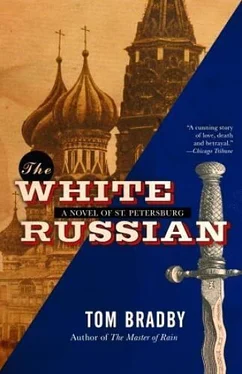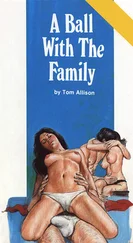It was still early, but they were not alone on the ice; two constables from the marine police had begun working the section of the river around the Strelka. As Ruzsky watched, one leaned forward and probed gently with his foot, before reaching back, taking a pole with a red flag from his colleague, and sticking it into the ice.
The pair appeared oblivious to the fact that a murder investigation was going on around them. They were looking for hazards, patches of black water, where a thin covering of ice concealed a pocket of five or six feet of water and a thicker layer of ice underneath.
Pavel was marching back toward him. Ruzsky wondered why none of the constables had bothered to go and tell the marine policemen to be on the lookout for a murder weapon.
“Not helping with the search, Deputy Chief Investigator?” Ruzsky asked Pavel as he climbed the steps toward him.
“They’ll never find anything.” Pavel glanced at him. “You look terrible, by the way.”
Ruzsky did not respond. Pavel had picked him up from the station upon his return from Siberia the previous night, and they had demolished a bottle of bootlegged vodka in the dingy room Pavel had rented for him.
They stood together in silence, their breath billowing out into the morning air. Pavel coughed.
The bodies had already been removed by the ambulance, but watching the constables scanning the ice, Ruzsky had a clear vision of the dead girl’s face. He could picture her laughing, her head resting on her companion’s shoulder as they stared up at the stars and the cold beauty of the city around them. The dawn of another year. Had they been wondering what it would bring? How could you not?
Ruzsky heard the sound of movement and turned to see a servant brushing snow from the porch of the Winter Palace behind them. The man was a tall Tartar in the distinctive cinnamon-colored coat of rough cloth and cap trimmed in silver braid worn by these most menial of palace staff. He, too, stopped what he was doing to watch the dark figures moving about on the ice.
“You must be excited about seeing your boy,” Pavel said.
Ruzsky frowned. His wife, Irina, had left him in Tobolsk six months earlier and returned to the capital, taking their son with her. Pavel knew the bare facts, but, so far, Ruzsky had managed to avoid all but the most cursory discussion of the subject. “She won’t allow me to see him,” he responded.
“She won’t allow it?”
Ruzsky could see that Pavel also blamed himself for the state of his marriage, but the surprise was not that Irina had left him, but that she had ever agreed to go to Siberia with him in the first place, as was the fact that she had stuck it out for two and a half years. It had been a last attempt to make the marriage work, and for a few months it had even looked as if it might succeed.
“Irina has gone to stay with my father,” Ruzsky explained. “She’s sheltering behind them.”
With a talent for deliberate provocation that he now recognized as one of her most striking attributes, Irina had, upon her return to Petersburg-or Petrograd, as it had been renamed at the start of the war-gone straight to live with his father rather than her own parents. The old man doted on his grandson and would deny him nothing.
Pavel shook his head. “He’s your son, Sandro. Just demand it.”
Pavel seemed about to go on, so Ruzsky forestalled him, wishing to change the subject. “When you think about it-”
“I’m not paid to think anymore,” Pavel responded.
Ruzsky gave him a stern look and continued. “I can’t understand those last three paces. The killer doesn’t come back and make any attempt to conceal them, and they’re clearly visible to even the most ignorant detective.”
“It shows you what people expect.”
Ruzsky stared at the steps in front of him. He wondered what the man had done to encourage such brutality in his assailant. “Who found the bodies?” he asked.
“An old woman walking home.”
“Did you speak to her?”
“Of course. She didn’t see anything.”
“What time did the constables call you out?” Ruzsky asked.
“I don’t know how you stand it, Sandro,” Pavel went on. “I wouldn’t manage a month without seeing my boy. Why did she leave?”
Ruzsky watched one of the constables talking to a marine policeman, thinking of how his wife had detested their stifling provincial life in Tobolsk, from the exaggerated respect afforded the governor, a petty tyrant from Petersburg, to the crumbling homes and small-town mind-set of the local gentry. He didn’t blame her. Not for that.
“A disintegrating marriage is not an attractive thing,” he said, quietly, reflecting upon the arguments that had raged in that tiny house at the end of a dusty street.
Ruzsky took a pace forward. He surveyed the river once more. “Is there anywhere else from where someone might have witnessed the murder?” he asked. But the wide expanse of ice answered the question for him.
The constables were working their way back toward the embankment.
“Well, we survived another night without a revolution,” Ruzsky said, turning toward his deputy. It was a teasing reference to Pavel’s vodka-induced doom and gloom the night before.
“I told you what is said in the khvost.”
The khvost was a phenomenon talked about even in faraway Tobolsk, but you had to see the lines of people snaking around windy street corners to believe them. The poor had to queue for anything and everything these days: food, oil for their lamps, clothes. They joined lines even when no one seemed aware of what lay at the front; it was bound to be something in short supply.
“What you don’t understand,” Pavel went on, “because you have not been here, is that people don’t read newspapers anymore. No one believes what little slips past the censors and so they treat what is said in the khvost as news, not rumor. They believe it.”
“Maybe the war will be over soon.”
“Maybe I’ll become the tsar.” Pavel leaned forward earnestly. “The word in the khvost-and it has been so for months-is treason.”
“That’s not exactly new.”
“One of our neighbors was in a line last night for bread. She told Tonya it was a four-hour wait. One woman said she’d heard from a cousin in the Life Guards that the imperial family had already left for England. Another said China had invaded. The day before, the khvost talk was that the Empress had agreed to be paid by the Germans to starve the peasants to death. Last week, it was said she had promised to sell the western half of Russia to Berlin. And the things that have been said about the Empress and Rasputin…”
“Perhaps things will improve now that the priest’s no longer with us,” Ruzsky said. They’d talked about Rasputin’s murder last night. The case had been taken over by the Okhrana, as had all recent cases that were deemed to have political significance.
“No. And it was too late, anyway. Do you know where the biggest khvost is? There’s a new railway ticket bureau since you left, in Michael Street. Now that so few trains run, the line there is five-deep. Thousands are leaving-to the Crimea or the Caucasus, or Haparanda.”
Haparanda was just over the border, in Sweden. “And here’s another thing,” Pavel went on, getting into his stride, “who would defend them? Tell me that. If it blows, who would fight to save the Romanovs?”
They’d had this discussion last night too. “The same people who always have.”
Pavel shook his head violently. “The blue bloods are not here. They’re at the front. Dead. You have seen it yourself; the capital is full of reservists, the wounded, deserters.”
“There’s one lot who would defend him,” Ruzsky said, pointing at a group of dark figures who had left the Strelka and were walking toward the Winter Palace. They were dressed in black and the man at the center carried a picture of the Tsar mounted on a wooden pole. They were singing the national anthem, “Bozhe, Tzaria Khrani”-“God Save the Tsar”-in loud, tuneless voices.
Читать дальше












